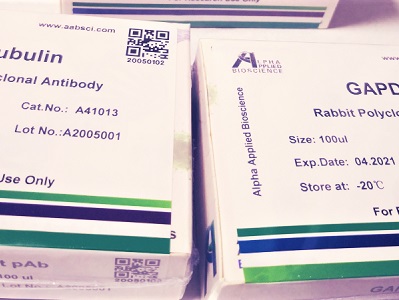

Ribosomal Protein S6 (phospho Ser235/S236) rabbit pAb
Cat :A20861
-
Source
Rabbit
-
Applications
WB,IHC,ELISA
-
Reactivity
Human,Mouse,Rat
-
Dilution
WB: 1:500 - 1:2000. IHC: 1:100 - 1:300. ELISA: 1:5000. Not yet tested in other applications.
-
Storage
-20°C/1 year
-
Specificity
Phospho-Ribosomal Protein S6 (S235/S236) Polyclonal Antibody detects endogenous levels of Ribosomal Protein S6 protein only when phosphorylated at S235/S236.
-
Source/Purification
The antibody was affinity-purified from rabbit antiserum by affinity-chromatography using epitope-specific immunogen.
-
Immunogen
The antiserum was produced against synthesized peptide derived from human S6 Ribosomal Protein around the phosphorylation site of Ser235 and Ser236. AA range:200-249
-
Uniprot No
P62753
-
Alternative names
RPS6; OK/SW-cl.2; 40S ribosomal protein S6; Phosphoprotein NP33
-
Form
Liquid in PBS containing 50% glycerol, 0.5% BSA and 0.02% sodium azide.
-
Clonality
Polyclonal
-
Isotype
IgG
-
Background
ribosomal protein S6(RPS6) Homo sapiens Ribosomes, the organelles that catalyze protein synthesis, consist of a small 40S subunit and a large 60S subunit. Together these subunits are composed of 4 RNA species and approximately 80 structurally distinct proteins. This gene encodes a cytoplasmic ribosomal protein that is a component of the 40S subunit. The protein belongs to the S6E family of ribosomal proteins. It is the major substrate of protein kinases in the ribosome, with subsets of five C-terminal serine residues phosphorylated by different protein kinases. Phosphorylation is induced by a wide range of stimuli, including growth factors, tumor-promoting agents, and mitogens. Dephosphorylation occurs at growth arrest. The protein may contribute to the control of cell growth and proliferation through the selective translation of particular classes of mRNA. As is typical for genes encoding ribosomal proteins, there are multiple processed
-
Other
RPS6, 40S ribosomal protein S6
-
Mol.Wt (Da)
28681
-
Concentration
1 mg/ml
| Product | Reactivity | Applications | Conjugation | Catalog | Images |
|---|
-
 400-836-3211
400-836-3211
-
 support@aabsci.com
support@aabsci.com
-
β-actin rabbit pAb ...... >
-
β-actin rabbit pAb(A284) ...... >
-
Plant-actin rabbit pAb ...... >
-
β-tubulin mouse mAb(M7) ...... >
-
GAPDH mouse mAb(2B8) ...... >
-
GAPDH mouse mAb(PT0325) ...... >
-
Histone H3 rabbit pAb ...... >
-
Histone H3 rabbit pAb ...... >
-
COX IV mouse mAb(6C8) ...... >
-
GFP-Tag mouse mAb(1G6) ...... >
-
HA-Tag mouse mAb(1B10) ...... >
-
mCherry-Tag mouse mAb(6B3) ...... >










 400-836-3211
400-836-3211
